|
The George Gipp Story
Buck Shaw: The Life and Sportsmanship of the Legendary Football Coach,
Kevin Carroll (2022) With most of his undefeated 1919 squad returning, Notre Dame coach Knute Rockne anticipated the 1920 season as eagerly as a child looking forward to Christmas. However, Rockne's expectations crashed that spring when the university expelled the team's star, George Gipp. The Laurium, Michigan, native had proven himself to be a gifted triple-threat halfback and fierce tackler since arriving on campus in 1916 as a 21-year-old freshman. A spirited and gifted competitor on game days, Gipp was a prima donna during the week. He often skipped practices. When he did show, Rockne occasionally banished him to work with the scrubs, which he did halfheartedly. But on game days, Gipp would again be in the starting lineup.
Reflecting on his temperamental halfback years later Rockne recalled:
You couldn't get him to exert himself any more than he had to, and if the games in which he played had happened to go Notre Dame's way, without much of a struggle, I doubt if Gipp would ever have been more than an average player. But let the game threaten to get out of hand, and there was no stopping Gipp. He played like a man possessed, and he played until he had expended every ounce of his great reserve power, if the situation warranted. Such an exhibition was the one he gave in the Army game of 1917. [Gipp's triple-threat performance was instrumental in the Ramblers' 7-2 victory.]
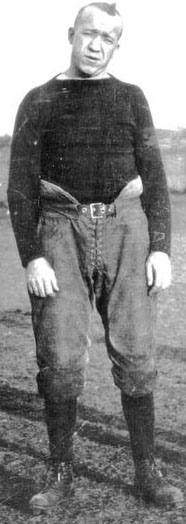   L-R: Knute Rockne, Notre Dame 1920 football game, George Gipp After defeating Valparaiso 28–3, Rockne's Ramblers journeyed to West Point in late October. Since the series' inception in 1913, the Army-Notre Dame game sparked the interest of New York City's working-class Catholics. Many, who never attended colleges themselves, now professed loyalty to the small Midwestern Catholic school, and rode the train 50 miles north to cheer their "adopted" school to victory. When the rivalry later moved to New York City, many local blue-collar Notre Dame fans rode the city's subways to the game—thus, the origin of Notre Dame's so-called "subway alumni."
Both teams entered the 1920 contest undefeated before a capacity crowd of 10,000 at Cullum Hall Field. This game more than any other may have been a true reflection of the legendary George Gipp's personality and athleticism. In a prelude to the afternoon's performance, Gipp engaged in a drop-kicking competition with Army's Russell "Red" Reeder during the pregame warm-up. When Reeder dropped out at the 40-yard line, Gipp walked to the 50-yard line and called for four footballs. He then drop-kicked two over the north crossbar before turning and nonchalantly kicking the remaining two over the south cross bar.
Soon after the kickoff, the game resembled a street fight. Behind the flashy performance of former Rutgers All-American Walter French, who returned a punt 60 yards for a touchdown and drop-kicked an extra point and field goal, Army took a 17–14 halftime lead. An irate Rockne spent much of the intermission reaming Eddie Anderson, whom he blamed for French's long scoring run. The coach then continued his tirade upon spying Gipp leaning against a wall calmly smoking a cigarette. "What about you, Gipp? I don't suppose you have any interest in this game?"
To which Gipp indignantly replied, "Look, Rock, I've got $400 of my own money bet on this game, and I'm not about to blow it."
In the second half, Gipp proved to be true to his word by playing like a "man possessed." After a scoreless third quarter, Gipp's runs and accurate passing led to John Mohardt's second touchdown run. Gipp then drop-kicked the extra point giving Notre Dame a 21–17 lead. Later, Gipp again demonstrated his versatility by returning a punt 50 yards to set up his team's last touchdown. Playing the greatest game of his career in Notre Dame's 27–17 win over Army, Gipp personally accounted for 332 total yards in rushing, passing and kick returns. The 6-foot, 185-pound halfback also kicked three extra points and threw a touchdown pass. Viewing Gipp's performance as a godsend, Eastern newspapermen zealously transferred Gipp's Herculean deeds to paper. While pounding their typewriter keys to meet their respective deadlines, sportswriters began the process of chiseling the name of George Gipp forever into the Golden Age of American sports.
In Notre Dame's inaugural homecoming game before 12,000 fans at Cartier Field on November 6, Gipp lived up to his press clippings. Despite playing only half the game, Gipp—with Buck Shaw and Eddie Anderson opening a huge hole off tackle—ran 80 yards for a touchdown and passed for another 171 in a 28–0 victory over Purdue.
Rockne's lads had a tougher time of it the next week in eking out a squeaker over Indiana at Indianapolis. Subjected to a severe physical pounding, Gipp exited the game early with what was initially diagnosed as a separated shoulder and possible broken collarbone. Nevertheless, with his team trailing 10–0 late in the second quarter, a heavily taped Gipp returned to score a touchdown and led Notre Dame to a 13–10 win.
On the jubilant trip back to South Bend, Gipp, although severely battered and bruised, departed the team train in Chicago to help his friend and former teammate, Grover Malone, coach a high school football team for a few days. Somehow, the coaching sojourn turned into a three-day drinking binge. When he boarded the train to return to South Bend, Gipp had developed a nasty cough. By kickoff the following Saturday, the cough was worse, with the halfback suffering from a fever and sore throat as well. Rockne had no intention of playing his ailing star at Northwestern.
Gipp watched as his teammates built a 21–7 lead. Almost 1,100 Notre Dame students had ridden the South Shore electric train to Evanston. In the middle of the third quarter, most began yelling, "We want Gipp!"; Northwesternfans joined in, and by the quarter's end the chanting by the crowd of 20,000 reached a crescendo. Usually indifferent to the cheering throngs, Gipp left his seat on the bench and gradually inched closer to Rockne, who was standing on the sideline. Early in the fourth quarter, Rockne looked over his shoulder and spotted Gipp bundled in blankets, standing near his elbow. He asked Gipp if he felt like playing, to which the halfback nonchalantly shrugged before replying, "Sure, let's go."
To the fans' delight, Gipp entered the game and on the first play dropped back and tossed a 35-yard touchdown pass to Eddie Anderson. On Notre Dame's next possession, Gipp decided to spread the wealth and completed a 54-yard scoring pass to Norm Barry, giving Rockne's gang a 33–17 win. Considering Gipp's deteriorating condition, it was an amazing and gutsy performance.
As his teammates were blanketing Michigan State 25–0 on Thanksgiving Day to give the Irish an undefeated season, Gipp lay gravely ill at South Bend's St. Joseph's Hospital, diagnosed with pneumonia and strep throat. The streptococcus infection quickly spread through Gipp's body. The dying 25-year-old's supposed deathbed request to Rockne to have his boys "win one for the Gipper" has been exhaustively covered in print and immortalized in the 1940 Hollywood movie Knute Rockne: All American.
Gipp died in the early morning hours of December 14, 1920. Over 1,500 Notre Dame students and townspeople attended the funeral in a blinding snowstorm and later escorted the coffin to the train carrying Gipp's body back to northern Michigan. The pallbearers included teammates Hunk Anderson, Ojay Larson, Joe Brandy and Norm Barry. The coffin was transported by sled the last six miles to the cemetery in Laurium. In his book The Notre Dame Story, Francis Wallace described the scene most poignantly when he wrote, "And the snows of Christmas powdered the grave of Thanksgiving's hero."
Playoff Lenny
Ron Higgins, Tiger Rag Extra: LSU's Super Bowl Six, March 2021
Leonard Fournette showed up for work, 13 days before the start of his fourth NFL season as a running back for the Jacksonville Jaguars. The former LSU all-American, the fourth overall pick in the 2017 NFL draft, was feeling healthy which was a good sign. Because when he had some pop in his well-used legs, he produced a pair of 1,000-yard rushing seasons as a rookie when he helped the Jaguars to the AFC championship game and in 2019 when he accounted for 30.6 percent of the Jags' offense.
Though there had been some turmoil in the months leading to the 2020 season–Jacksonville declined Fournette's fifth-year option in his contract last May and tried to unsuccessfully trade him and his $4.2 million salary–he was happy to get back to work in the midst of the coronavirus pandemic.
Until that Aug. 31 morning when he pulled up at the entrance of the fenced Jaguars' practice facility. "Someone was at the gate saying (head) Coach (Doug Marrone) wants to see me," Fournette recalled. The meeting didn't last long. Marrone told a stunned Fournette he was releasing him from the team. "There was no explanation," Fournette said. "It just happened; it was a terrible feeling."
A couple of days later in a press conference, Marrone explained why he cut Fournette. "At the end of the day, we feel the skill sets of the guys that we have (can replace Fournette), and really that's what led to the decision," Marrone said.
For the first time in his football life that started on the playgrounds of New Orleans' Seventh Ward and traversed through St. Augustine High and LSU, the guy who always had been running back No. 1 on every depth chart, who got the most carries, who shouldered the offensive load against defenses stacked to stop him, was told he was not good enough to stay on a roster.
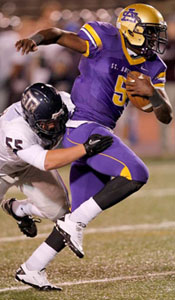 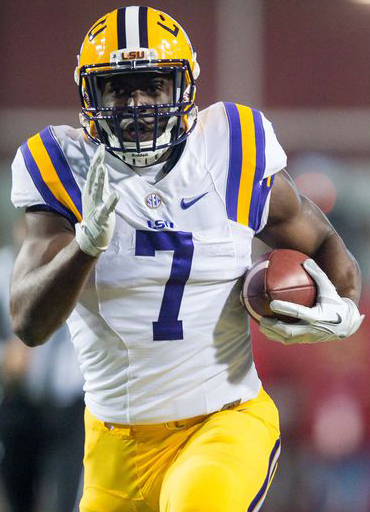 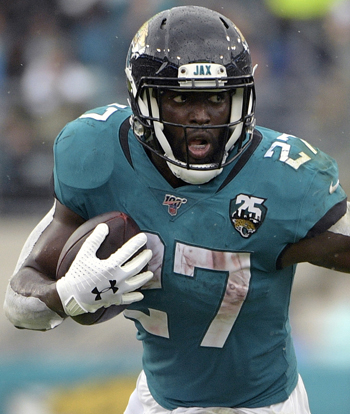 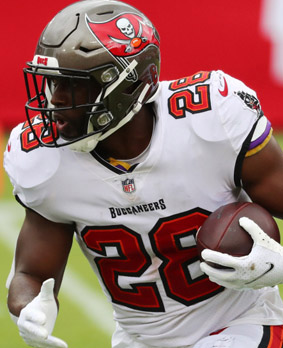 Leonard Fournette with St. Augustine, LSU, Jacksonville, and Tampa Bay. Just about six months later to the day, he officially signed with a new team and around three weeks removed from his 26th birthday, Leonard Fournette walked off his homefield in Tampa on the night of Feb. 7 a Super Bowl champion after the most satisfying game of his career as the starting running back for the Tampa Bay Bucs.
The former first-round draft choice that Jacksonville dumped without taking any trade deal to get players in return had just run through the defense of defending Super Bowl champion Kansas City for 89 yards including a 27-yard third-quarter touchdown on 16 carries. He also caught four passes for 46 yards, not dropping any ball thrown his way or the Lombardi Trophy awarded to the Bucs for their dominating 31-9 Super Bowl 55 victory.
In Zoom media interviews afterwards, Fournette was asked to reflect on his journey from the Jacksonville cut list to being sized for a Super Bowl championship ring after his performance of redemption. "I don't have to say too much," Fournette said with a thin smile. "You all know, we all know, I'm just blessed, so I'm going to leave it there."
He didn't say it, but Fournette was probably hoping that Maronne, the coach that gave up on him, got an eyeful in his crowning moment of glory. Maronne certainly had time to watch the game since he was fired Jan. 4, a few days before Fournette started his four-game romp through playoffs in which he ran for 300 yards and three TDs on 64 carries and caught 18 passes (21 targets) for 148 yards and 1 TD.
"He was amazing and just did it all, blocked, ran, just had an incredible season," said Bucs' 43-year old seven-time Super Bowl champion QB Tom Brady, who Fournette calls "Old Head." "We got him pretty late and he just showed up big. It was amazing how he performed in the biggest moments. Just so proud of him."
Fournette's regular season stats, 397 yards rushing and six TDs on 97 carries and 36 receptions for 233 yards in 13 games with three starts, were a far cry from his 1,000-yard rushing seasons as a Jaguars' rookie in 2017 and in 2019 when he averaged a combined 19 carries per game.
His role for most of the 2020 regular season - as a backup to starter Ronald Jones - was completely foreign to him and difficult to swallow. Suddenly, Fournette was living in a world that former LSU backup running back Darrel Williams had tolerated for four years of college and three NFL seasons with the Chiefs.
"It was a tough year for me," Fournette said. "As a competitor you want to be out there, you want to compete. You want to play as hard as you can and help the team."
Todd McNair, Tampa Bay's running backs coach who played eight NFL seasons as a third-down back, a lead blocker and special teams player, sympathized with Fournette. But he also gave him tough love.
"The biggest thing with Leonard was him accepting his role and accepting he wasn't THE superstar, wasn't THE man," McNair said. "Some guys since high school have gone through their whole career where they've been coddled. Sometimes when you get released, you have to be shocked into reality like this can go on without you. If you're self-reflective, if you're true and honest with yourself, you can say, 'OK, maybe I need to change this; maybe I need to change that.'
"With any team that's successful, the approach is, 'What can I do for my team, not what can the team do for me?' It's a testament to the way Leonard embraced his role. You never know in this league. You can be THE man one minute, you could be traded the next."
Every time Fournette got discouraged during the season, he took solace in family time just as he did for a week after being cut. "I was chilling with my kids (after he was cut)," Fournette said, "and I realized they are my why in why I do this, they are why I play, this is what I'm doing it for, I'm doing it for them. I just tried not to lose focus on the bigger picture of what's going on and just kept going forward."
When Jones missed the final three regular season games after contracting COVID, Fournette stepped into the starting spot and never took his foot off the gas. Just as he did with the Jags' 2017 three-game playoff run when he ran for 272 yards and four TDs on 70 carries to earn the nickname "Playoff Lenny," he came alive while discovering a new truth. His vastly lighter regular season workload resulted in considerably fresher legs in the biggest games of the year to write a storybook ending to a season that started for him as a nightmare.
|